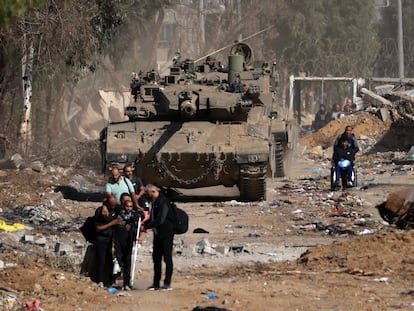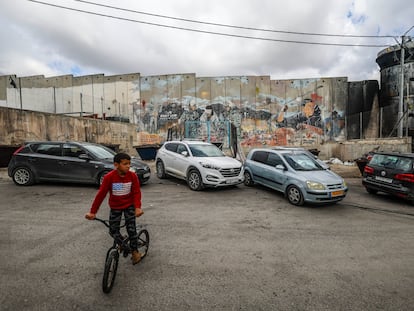Israel and Hamas agree to extend truce by two more days
20 Israeli hostages and 60 Palestinian prisoners are expected to be released between Tuesday and Wednesday

The Qatari government, the main mediator in the conflict between Israel and Hamas, announced on Monday afternoon a two-day extension of the truce that began last Friday morning. Thus, the cease-fire is extended until early Thursday morning and the daily exchanges of hostages held by Hamas in Gaza for Palestinian prisoners in Israeli jails will continue until then. In principle, these exchanges will mirror the ones that have occurred in recent days, with 20 more hostages expected to be released in exchange for 60 prisoners.
“An agreement has been reached with the brothers in Qatar and Egypt to extend the temporary humanitarian truce by two more days, with the same conditions as in the previous truce,” a source in the Palestinian fundamentalist movement told Reuters. “I hope we can extend it until we reach the end of this war and the end of the aggression against our people in Gaza,” Ghazi Hamad, a member of Hamas’ political bureau, told Al Jazeera, optimistically. Hamad believes that, in addition to the support of Qatar and Egypt as mediators, this is also what Western governments are hoping for. Israel also confirmed the extension of the truce, according to a source consulted by the Haaretz daily.
Throughout Monday, the fourth and last day of the truce agreed upon last week, optimism grew at the expectation that the pact would be prolonged. The announcement to extend the ceasefire until Thursday came as the parties prepared for the fourth exchanged supervised by the International Committee of the Red Cross: 11 hostages are scheduled to be released on Monday in exchange for 33 Palestinian prisoners from the West Bank and East Jerusalem.
Both Israel and Hamas had previously hinted that they wanted to extend the truce. They were under pressure from the international community, which sees the current hiatus as necessary. The pause is preventing the Israeli army from resuming its attacks on Gaza — where nearly 15,000 people have been killed — in response to the October 7 Hamas massacre. The extension was endorsed by the main mediators in the ongoing war — Qatar, Egypt and the United States — as well as by the European Union, NATO and the United Nations through its Secretary General, António Guterres.
In Israel, Prime Minister Benjamin Netanyahu also faced mounting domestic pressure, particularly from the families of the 200 or so hostages still held in the Palestinian enclave, for whom securing their loved ones’ safe return is the top priority. Even the Palestinian National Authority (PNA), which maintains administrative control of the West Bank but not Gaza, expressed its support for the extension of the cessation of hostilities, which would give the hard-hit population of Gaza more time to stock up in the event that the invading forces resume their military campaign.
Israeli authorities had expressed their desire to extend the truce day by day, while the intermediary countries pushed for a more ambitious multi-day agreement, which ended up being the case, according to an Egyptian security source quoted by Agence France-Presse. Hamas, for its part, had proposed extending it between two and four days, according to the same agency. Egyptian government spokesman Diaa Rashwan said that the parties were close to agreeing to a two-day ceasefire in exchange for the release of 20 hostages from Gaza and the release of 60 more prisoners. From Washington, National Security Council spokesman John Kirby confirmed the extension.
In the first three days of the truce, Hamas released 54 hostages and the Israeli authorities released 117 Palestinian prisoners.
Israel maintains that, once the hostages have been released, it will continue its attacks on the Strip to wipe out Hamas. “If you want peace, destroy Hamas,” insisted Israel’s Prime Minister Benjamin Netanyahu after accompanying Elon Musk on his visit to one of the sites of the October 7 Hamas attacks.
Unlike the testimonies that emerge from the freed Palestinian prisoners, Israel jealously guards any information brought back by the hostages from their weeks of captivity. However, it did transpire that Roni Krivoi, the Russian-Israeli citizen released on Sunday night, managed to escape from his captors and remained in hiding for four days before being recaptured, his aunt Elena Magid explained, as reported by Times of Israel, which cited Radio Kan. The young man, released as a gesture from Hamas to Russian President Vladimir Putin, was in a building that was partly destroyed by the bombings, so he was able to escape. “He managed to escape and hid alone for several days. In the end, the Gazans captured him and returned him to the terrorists’ hands,” Magid said.
Meanwhile, the most hard-line wing of Netanyahu’s government continues to defend the presence of settlers — around half a million — in occupied Palestinian areas. On Monday, Finance Minister Bezalel Smotrich proclaimed that, despite the restrictions that the war imposes on the country, an allocation of around $1.3 billion destined for these settlements — considered illegal — and for the ultra-Orthodox Jewish community should go ahead. This comes at a time when Israeli settlers are actively involved in the escalating violence against Palestinians in the West Bank.
Sign up for our weekly newsletter to get more English-language news coverage from EL PAÍS USA Edition









































